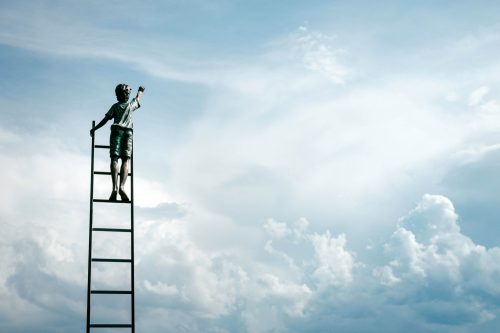What will our future child need (and want) to learn?
When we came to the realisation that our purpose as an education body is to “prepare children for a world that doesn’t yet exist” –we were taken aback by the starkness of our own language. Still, this has been true for any generation of school leavers in the last 100 years. The world of work outside of school tends to evolve a lot more rapidly than the education system does – and this disconnect has gone into overdrive over the last 20 years.
The pace of change is accelerating - to the point where the entire framework of our economy and jobs market is undergoing a huge shift that our education system is not responding to. The Education Space is constantly looking forward to the impact that AI and automation is going to have on the types of jobs available to our students once they leave school. Add in the impact of climate change, and the stakes for our future children are becoming higher by the day.
Children in schools right now recognise this – they are fully aware that their world will be a vastly more complicated place by the time they leave school. In 2019 school children all over the country went on two mass environmental strikes, thousands protesting outside parliament asking the UK government to do more about climate change. Many commentators have said that our student generations have more clarity on this huge issue than our politicians, yet as long-time educators we have seen time and time again how the voice of children is ignored and not listened to.
 The age old maxim “children must be seen and not heard” has cut us off from hearing the voices of humans who will, very soon, become adults and be asked to walk in our place. We see the voting age issue as a huge sign of disrespect to our younger generations – there has been widespread frustration in our schools at 16 and 17-year-olds not being able to vote in the EU referendum, when it is their futures who are being decided.
The age old maxim “children must be seen and not heard” has cut us off from hearing the voices of humans who will, very soon, become adults and be asked to walk in our place. We see the voting age issue as a huge sign of disrespect to our younger generations – there has been widespread frustration in our schools at 16 and 17-year-olds not being able to vote in the EU referendum, when it is their futures who are being decided.
Many school teachers supported their students to take action in these recent strikes and channel their passion into activism - a good example of how adults can be advocates for younger generations and empower their collective voice. Considering that younger generations have more access to ideas and technology than any before them, there are many innovators and movements coming through from the youth that we should be taking seriously.
Take a look at some of the teenage entrepreneurs coming through in the last decade. Several teen inventors and innovators have been picked up by the press and touted as ‘prodigies’ and adorable ‘miracle kids’. However, the things that purpose-led students can achieve with the right support and a powerful idea is a lot bigger than all that.
Boyan Slat founded The Ocean Cleanup project when he was just 18 – and his idea has bloomed into a team of 80 engineers, scientists, researchers and computational modellers working daily to remove plastic from our oceans. Slat’s invention came about through a project he worked on at school, nurtured and developed until it became something potentially world changing. In a similar vein, the recent Netflix film The Boy Who Harnessed The Wind tells the story of William Kamkwamba. As a teenager growing up on a desolate farm in Malawi - Kamkwamba taught himself to build a wind turbine using a dusty McGraw-Hill textbook called ‘Using Energy’. Now listed on ‘Forbes 30 under 30’ and an international inventor and speaker, Kamkwamba is another example of the creativity, impact and ingenuity that a young mind can produce.
While these tech entrepreneurs might be high flyers, we see them as representative of an industrious, innovative spirit alive in younger generations today that is completely under-reported by the media. The children we see in school are creative and impassioned. This is not currently being nurtured by their education system in the way that it could be - this missed opportunity is one of our main drivers to improve the education available to our students.
Our society and our education system must realise that children are ready to have more of an impact on the world. The collective actions they can take using social media has shown them the power of collaboration; they intuitively understand the power of big ideas that go viral and swoop through a population. They understand that our new world is built on social capital, and that understanding who you are as an individual gives you a lot more power than paying your dues to an outdated system.
We believe that children shouldn’t feel like dropping out of school is the best route to making a real difference. Society is heading in a direction that is more sustainable, and is going to require more action, more direct involvement from empowered citizens who want to shape our future for the better. We could be supporting our students to become these individuals, if we built the clear purpose they crave into their education.
Overall, we think the education system should take inspiration from developments in the business world when it comes to listening to your audience, and putting your user experience above all else. Customer-centricity is shaking up marketing departments and start up think tanks worldwide – businesses are having to evolve to put their customers’ needs and wants at the centre of everything they do to keep their share in the market.
The education system should remember that their students are the primary users. Not parents, and not politicians. Our student body is our real customer base, and we should be serving their needs – now and in the future - first.
They deserve an education system that is going to prepare them for the real world they will be met with when they exit school. They deserve to learn things that spark real passion inside them, things that will empower them and sustain them in our flux economy.
Our students should feel like their educators are on their side, and are listening to what is being said. If you look at breakthrough businesses coming through from brilliant kids and school leavers – these enterprises are designed to make a difference, to have a positive impact on the world.
We should be supporting our future child with every resource we have. Out of anyone, they will be the ones who will save our future society.




